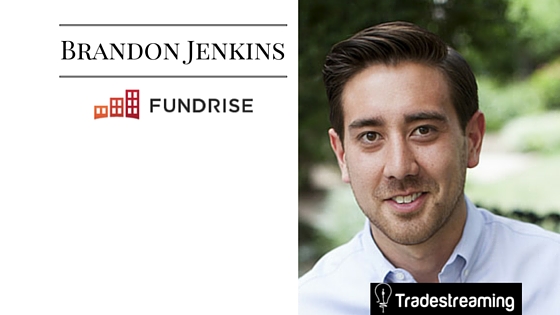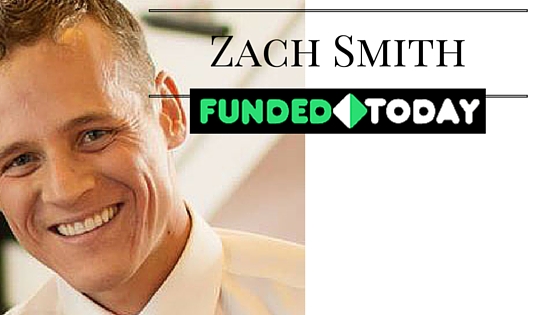Is crowdfunding the religion of choice for millennials?
The 6 shadiest fintech industries
High Five! The top 5 fintech stories we’re following today
Has PayPal soured on crowdfunding?
Crowdsourcing, banking, and the future of enterprise collaboration according to Crowdsourcing Week’s Epi Ludvik Nekaj
Epi Ludvik Nekaj is the founder and CEO of Crowdsourcing Week
What is Crowdsourcing Week and where did the inspiration come to launch it? Why crowdsourcing and why is it so interesting now?

Crowdsourcing Week (CSW) is a global platform for innovators to present collaborative solutions that are relevant in the 21st century. Our aim is to capitalise the abundance of platforms, ideas, technologies, and crowds, turning these resources into social productivity. We want to empower the people to use all these means to create shared value across all sectors. One of our goals is to enable organisations to see crowdsourcing in a completely different light.
When I launched CSW, 2+ years ago, the term was in its infancy, but now I believe it has become fundamental to the digital economy. Today, the convergence of technology, connectivity and crowds is producing a massive hub of ideas and innovations. I am placing my bet on the crowd’s ability to create and produce valuable and meaningful products and services.
What are the challenges/opportunities of building a global media business in today’s market?
CSW is a knowledge hub on the crowd economy for the new generation of leaders. We have a community based approach and that takes time to build. When operating on a global scale we have to adapt to diversity in culture and stay ahead of trends. Operating in a tech-enabled ecosystem requires a different mindset. We have to be open to collaboration and lay less emphasis on competition, and that’s what the crowd economy is all about—open, shared, transparent, with a twist of caution for the new paradigms we are exploring.
What are some of the most exciting trends in crowdsourcing? What are some of the most overrated?
Crowdsourcing has moved beyond being just a competition to source the next slogan for your brand. The exciting applications I see span finance where crowdfunding is rewriting all rules of how projects get off the ground. Crowdsourcing is coming to smart city and mobility development in a big way and will play an important part in making cities more livable, more resource efficient and inventive. Large organizations are using crowds like never before to remain competitive and even change their business offerings for the hyper-connected population.
Our next week-long global conference, CSW Global is coming to London, April 11-15, next year and will feature all these key topics. Another area I am very excited to see grow is the education sector. With the launch of our integrated e-learning program, this is one of the areas we will focus on post our equity crowdfunding raise on Crowdcube.
There are a lot of start-ups bringing innovative business models using crowdfunding. How are incumbent firms incorporating crowdsourcing into their own existing models?
The banking sector is waking up to crowd-powered applications like crowdfunding and blockchain protocol. They see value in exploring crowd currencies—on how to integrate the block chain technology into the banking system because it’s scalable. Barclays is the first premier bank to accept bitcoin. BNP Paribas Fortis is also one of the pioneers in incorporating crowdsourcing into its banking system that have subsidiary companies that are into crowdfunding, as they see them as a potential partners rather than competition.
This is a great way to stay relevant, to source financing for start-ups and facilitate innovation. Instead of building physical bank locations, banks are thinking about service innovation and this change in mindset and attitude is key.
Where are you taking your business in 2016?
The outlook for 2016 and beyond is looking very exciting for Crowdsourcing Week and our subsidiary consulting company, CSW2. We are most excited about building crowdcapital through our crowdfunding round. We plan to expand our consulting arm CSW2, spearheaded by our consulting think tank and crowdsourcing experts, while also launching an integrated e-learning platform that will be accessible globally to harness “social productivity” and educate participants on the Crowd Economy.
In 2016, CSW events will launch in new markets that include Africa and the Middle East: we have plans for Tehran, Johannesburg, San Francisco, Seattle, Dubai and Latin America. And after 3 years in Singapore, our flagship global conference is moving to London in 2016. Very exciting times ahead indeed.
5 trends we’re watching this week
[alert type=yellow ]Every week at Tradestreaming, we’re tracking and analyzing the top trends impacting the finance industry. The following is a list of important things going on we think are worth paying attention to. For more in depth trendfollowing, subscribe to Tradestreaming’s weekly newsletter (published every Sunday).[/alert]
1. [podcast] Stephane Dubois of Xignite on providing stock market data to (almost) all of fintech (Tradestreaming)
You can build your own apps or sell tools to others building apps. Xignite powers today’s top investment platforms with stock market data. Founder and CEO, Stephane Dubois joins Tradestreaming to discuss his 10+ years building stock market data products powering most of today’s top fintech platforms.
2. BBVA investment in Atom is a small step in a much larger plan (BANKNXT)
BBVA has invested $68 million in Atom Bank (here’s the story from Bloomberg). Daniel Gusev believes this is part of a much larger digital strategy for the bank.
3. Diebold To Acquire Wincor Nixdorf (PYMNTS)
Diebold will soon be the largest ATM maker in the world — if regulatory authorities approve its latest move to buy out rival Wincor Nixdorf.
4. The Disruption Of Millennial Investing (TechCrunch)
The media proliferates stories analyzing millennials’ work ethic, buying patterns and values. But what about investing? What’s changing with the way millennials invest?
5. First crowdfunding results: 70 go bust, one makes money (Telegraph)
Some celebrities, including Andy Murray, are investing in crowdfunding, but the risks are high. This article, based on one of the first studies out of the nascent equity crowdfunding field, shows just how risky early stage investing really is on these platforms.
Fundrise’s Brandon Jenkins on the need to keep raising the quality of real estate deals online
Fundrise is a leader in online real estate investing and it’s soon to get even more interesting as recent regulatory changes are making it easier for crowdfunding platforms to incorporate even more investors. It’s an interesting time for the firm: it recently announced it had raised $50M for an e-REIT in light of the new Regulation A+ changes.
Fundrise COO, Brandon Jenkins joins us to talk about the state of his business, how competition in online real estate investing is changing the market, and how he thinks 2016 is going to turn out to be a huge year in his industry.
What was the inspiration for creating Fundrise? What was the genesis story?
The idea behind Fundrise came out of the personal experience of our founding team as real estate developers in Washington, DC. After an unsuccessful experience seeking funding for a new type of real estate project with local tenants, we saw an opportunity to open up the world of real estate investing to a broader audience.
More players are entering the online real estate investing space — how do you differentiate yourself? How do you think the market is organizing (is it around debt/equity or residential/commercial?)
First and foremost quality. We only work with the best quality real estate companies and search through hundreds of deals a week selecting only the top 1% to actually offer as investments.
Second, we focus on providing unmatched customer experience by creating a one-of-a-kind platform. Our technology is 100% designed and built in house…from scratch, so that the experience of investing on the platform is as straightforward and enjoyable as possible.
How big a role does education play in investor acquisition?
When you democratize an asset class for the first time, you’re naturally going to connect with investors who’ve never picked their own real estate investments before.
To that end, we take education very seriously.
Our biggest concern right now is around the quality of deals being done by other platforms in the space. We’re seeing other companies do bad deals, with bad prices and bad terms so we feel that we have an obligation to give investors the tools they need to make smart, informed decisions — whether that’s a deep dive into our underwriting process or a rating system for understanding risk-return tradeoffs.
You moved from a brokerage model to more of an origination model — why? how did that position you differently?
Funding all our investments upfront using our own $25M balance sheet has a few key benefits:
1. You see higher quality investments: We can negotiate better deals with top real estate companies because they require certainty of funding. By funding real estate projects upfront, we believe we are able to achieve superior pricing and terms, and source more investment opportunities from the best companies in the country.
2. You start earning immediately: Interest starts accruing as soon as your investment settles—typically within five days—eliminating lengthy escrows. This model more closely resembles stocks, bonds, and other publicly-traded securities.
3. Your interests are the same as ours: Fundrise pre-funds every real estate project, using our own balance sheet. This puts our “skin in the game” and shows our conviction in the deal.
Where is your business/market headed in 2016 and beyond?
Since we founded the industry back in 2012, real estate crowdfunding has seen tremendous growth. But it’s really just beginning. 2016 will be a huge year for the space. I think we’ll start to see consolidation of platforms and some platforms really start to own one and dominate an asset class — like the SFH market. Investors will begin to enter the space in droves.
Coolest Cooler turns warm: More crowdfunding disappointment
How Funded Today’s Zach Smith raises millions of dollars for its crowdfunding clients
While crowdfunding is a great example of the growing democratization of capital formation online, many of the top campaigns turn to professionals for help running their campaigns. One of these professionals, Zach Smith, founded a firm to do exactly that. Funded Today has helped over 150 start-ups achieve success. In one example, with the help of Funded Today, BauBax raised $9.1 million to launch its travel jacket, making it the most funded clothing project in the history of crowdfunding and the 4th most successful Kickstarter project of all time.
Zach Smith, co-founder of Funded Today joins Tradestreaming for an exclusive interview.
Why would crowdfunding campaigns turn to an agency? Can you crowdfund on your own?

You can crowdfund on your own, but any campaign needs some marketing in place, and unless you’re an expert in PR and paid media, you’re leaving a lot of money on the table. With a campaign that has a good product and does no marketing, Funded Today increases pledges by 1000%.
Has crowdfunding gotten more competitive — if so, how?
What are some of the tools in your toolbox that help you be successful for your clients?
What components are necessary for a successful crowdfunding campaign?
- good product and good marketing
- a good product with bad marketing
- a bad product and bad marketing, called “outer darkness,”
- a bad product with good marketing, a “black hole”.
We also have a formula we came up with: Ubiquity + Techy (i.e. groundbreaking technology in their field) + Chill Factor Story + Amazing Video = huge chance of success.
So, ubiquity means is it everywhere. One example is one of our clients called Trunkster. They developed luggage and of course everybody has luggage. Another example (not one of our clients) is Pebble Watch: it’s a watch but the client made it like an Apple iPhone. Or the Coolest Cooler (not a Funded Today client). SilverAir invented socks that don’t stink. By soaking the fibers of the cloth in silver you can wear their socks for 10 days. These are a few examples of clients that fit that success formula.



















